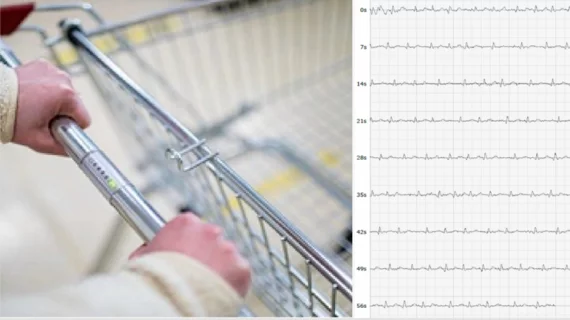Cardiology at the supermarket: Shopping carts upgraded to detect signs of AFib
Adding electrocardiogram (ECG) sensors to shopping carts can helps identify patients who may have atrial fibrillation (AFib) or other heart rhythm issues, according to new research presented at ACNAP 2023, a scientific congress hosted by the European Society of Cardiology (ESC).
The study’s authors examined ECG data from more than 2,000 shoppers who visited one of four supermarkets over the course of two months. Sensors manufactured by MyDiagnostick were attached to the handles of shopping carts, making it convenient for the shopper to undergo the scan. Each 60-second ECG resulted in one of three results: the patient showed no signs of AFib, the ECG was unclear and the patient was invited to try again or AFib was detected, triggering the booking of an appointment with a cardiologist.
Overall, 220 participants showed signs of AFib. When a cardiologist reviewed these findings, however, they found that 161 patients either had unclear results or showed no evidence of AFib, leaving 59 patients with confirmed AFib. The average age of this group was 74 years old, and 57% were men. Twenty patients had previously received a diagnosis of AFib.
“This study shows the potential of taking health checks to the masses without disrupting daily routines,” first author Ian Jones, senior cardiac nurse at Liverpool John Moores University in the U.K., said in a prepared statement. “Over the course of two months, we identified 39 patients who were unaware that they had AFib. That’s 39 people at greater risk of stroke who received a cardiologist appointment.”
Jones et al. evaluated the effectiveness of their ECG sensor, concluding that it achieved a sensitivity that ranged from 0.70 to 0.93, a specificity that ranged from 0.15 to 0.97, a positive predictive value ranging from 0.24 to 0.56 and a negative predictive value ranging from 0.55 to 1.00. This means that there were a high number of false positives.
“Before we conduct [a follow-up study] some adjustments are needed to make the system more accurate,” Jones said in the same ESC statement. “For example, having a designated position on the bar to hold onto, as hand movement interfered with the readings. In addition, ESC guidelines require just a 30 second ECG to diagnose AFib, so we aim to find a sensor that will halve the time shoppers need to continuously hold the bar.”[1]
An early protocol of this study was published in the Journal of Personalized Medicine in 2022.[2]

